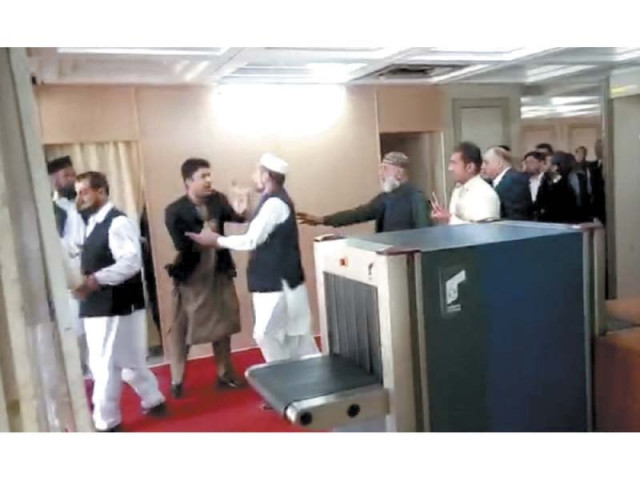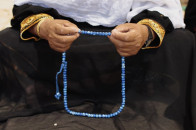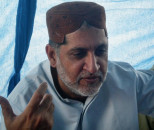Abusing women - a timeless trait of Pakistan’s macho politics
The ability to inflict insults at one’s womenfolk is a major signifier of male toughness in patriarchal cultures.

Fellow MPs try to stop PTI’s Murad Saeed during a scuffle with PML-N’s Javed Latif. PHOTO: INP
Abuse of womenfolk is, unfortunately, a familiar concept in Pakistani politics. Earlier this year, Sindh Assembly witnessed an ugly episode when Works and Services Minister Imdad Ali Pitafi called MPA Nusrat Sahar Abbasi a ‘drama queen’ who is always vying for cheap publicity. Another one that made headlines was the insult directed by Minister for Water and Power, Khawaja Asif toward PTI’s Shireen Mazari. He referred to her as a ‘tractor-trolley’, reflecting underlying sexism based on body type and gendered behaviour.
Swearing has globally been associated with unwarranted aggression and impoliteness but due to centuries of engrained sexism, it is often unduly directed towards women, even when the subject is male. A large number of commonly used swear words are aimed at insulting the subject’s mother or sister.
Almost by default, an insult directed towards a grown adult male involves the women in his life. This is owed to the fact that the concept of ‘honour’ is vested in women’s bodies and a socially-prescribed idea of morality that women must adhere to. Women have historically represented ‘weakness’ in popular perception and hence they unwillingly become responsible for the actions of their male kin. Their bodies and reputations are expected to bear the baggage of pure, nasty male aggression.
In patriarchal societies, women are the representatives and bearers of tradition. Feminist studies have talked about this concept with regard to militarised mass rape that takes place as symbolism to show ethnic or national prowess through women’s bodies over another group of men.
Masculine honour beliefs manifest themselves in a variety of ways; one of which is to show aggression in the face of insult subjected towards one’s family, partner or reputation. Research conducted on the culture of the American south presents an interesting case in this regard.
Individuals who upheld masculine honour beliefs felt that any attack on women, including rape, was an attack not just on the victim but on her family’s honour and by association its male members. The results also showed that such individuals tended to view the victim as a source of stigma and displayed negative attitudes towards her.
But in a more subtle way, these behaviours are reflected in everyday speech between men, whereby ‘locker-room talk’ often involves abusive terms being used towards women, even when the target of the insult is a man. These terms are either directly used by referring to female body parts or to her promiscuous behaviour; in both cases, the woman’s sexuality is used as a means of attack on a man’s honour.
This ‘locker room talk’ unfortunately carries on to the echelons of power. Politics continues to be a male-dominated terrain, in most parts of the world and despite changes through emancipation, women are still subjected to abuse in more subtle forms. Academics and activists alike are critiquing US President Donald Trump’s sexist remarks. Meanwhile, female politicians from Spain such as Anna Gabriel and Teresa Rodriguez have also talked at length about the fact that criticism that they face almost always has something to do with the way they look or behave in accordance to socially-prescribed norms.
The ability to inflict insults at one’s womenfolk is a major signifier of male toughness in patriarchal cultures. Therefore, what may seem as a brief moment of male aggression outside the Parliament to many, has perennial consequences for women. Ayesha Gulalai, a female MNA of PTI, criticised Latif for his use of words saying that everyone has sisters and mothers and they must not be insulted. Such arguments further perpetuate the idea that a woman’s ‘primary’ identity is that of a daughter, wife, mother or sister. Concepts of benevolent sexism take away agency from women and they end up upholding and cherishing their own policing as a method of guarding their family’s honour.
Interestingly, on the other hand, research has shown that social attitudes are even less forgiving when swearing comes from women. It is considered beyond the boundaries of acceptable ‘feminine’ behaviour. Why then must women bear the brunt of these insults when unchecked male aggression is allowed to thrive?
Shanel Khaliq is a freelance journalist and a teacher who is interested in issues related to gender, race and social justice. She tweets @Shanel9999



















COMMENTS
Comments are moderated and generally will be posted if they are on-topic and not abusive.
For more information, please see our Comments FAQ